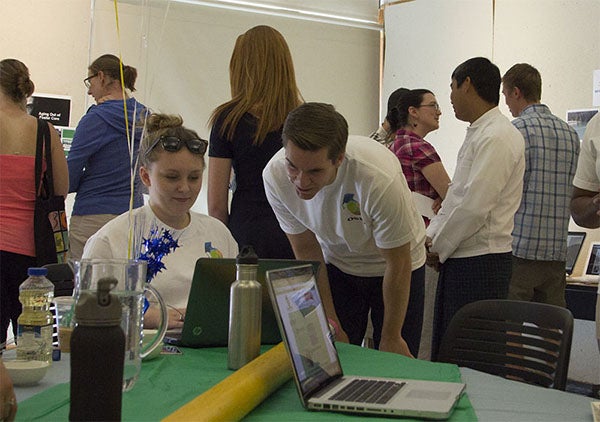
PPPM 480 nonprofit management students spent spring term building 13 fictitious nonprofit organizations from the ground up. A gathering during finals week drew a lively crowd eager to see the faux organizations’ new websites, which were very real and functional even though their organizations—created specifically for Instructor Bob Choquette’s class—were not. Photo by Cody Rappaport.
“Want me to give you some money?” Instructor Bob Choquette said while thrusting a wad of bills into a Lawrence Hall visitor’s hands recently.
Just a few feet away, a student was promoting Zombie Awareness Day as a way to educate Oregonians about drought and wildfire. Across the room, a group of students was promoting beekeeping. Others were advocating for helping foster kids, families in poverty, or teaching how to buy and prepare healthful foods affordably.
What these all have in common is how nonprofit organizations can connect people within a community.
The gathering during finals week was the culminating event for PPPM 480 nonprofit management students who spent spring term building 13 fictitious nonprofit organizations from the ground up. The event drew a lively crowd eager to see the faux organizations’ new websites, which were very real and functional even though their organizations—created specifically for Choquette’s class—were not.
“They are all ideas,” Choquette said of the nonprofit groups the students created. “The students had to come up with the idea, then research and assess whether this idea was already saturated in the area—in essence [develop] a business plan.”
That included writing a mission statement, naming a board of directors, writing goals and objectives, identifying funding sources, and providing an analysis of their organization at the one-, three-, and five-year stages of its growth.
As for the money giveaway, that’s how visitors could “donate” to their favorite worthwhile cause: Stacks of Monopoly-sized dollar bills were handed out in random quantities to everyone who came through the door. After listening to each group’s sales pitch and viewing their website, visitors literally left money on the table of the organizations whose missions they liked best.
The students’ websites showed an impressive level of detailed research and analysis in just 10 weeks of class time.
Waterfull Oregon’s mission was to help Oregonians become more aware about drought. “Not a lot of people like to talk about climate change, drought, or wildfires, but if you frame it in a way of zombies, then people can get really excited about it,” said Samuel Huck, a PPPM minor and environmental studies major. “We’ll plop down a zombie apocalypse in the community. They’ll experience things like getting chased by zombies, learn basic survival skills like how to build a fire and shelter, as well as things like growing their own food, how to make a safety kit, things like that.”
The nonprofit group Resurgence focused on helping foster children. “The statistics for foster care children are really scary because the odds are really against them,” said Guadalupe Ayala, a PPPM major. “A lot of them don’t graduate high school, and even if they do only 2 percent go to college. So we want to build new skills so they can better their future.”
Resurgence’s plan includes building a center for community events and where “kids have the opportunity to meet other foster children so they can talk about some of the same issues they’re dealing with. Foster care children get moved from home to home and lack stability, so we want to build a good foundation for the kids so they can have opportunities to be successful,” Ayala said.
PPPM senior Tom Fiorelli’s group, ¡Bienvenidos! Families in Transition, aims for “cultural competency” through community relationship building, specifically so local farmers can teach people how to grow food and kids can have a safe place to go after school while gaining knowledge about food production and preparation.
“What’s beautiful is we have members from all different cultures who grow all kinds of different foods, so this exchange of information brings different families produce they’ve never even heard of,” Fiorelli said. The ¡Bienvenidos! bilingual website even includes information about land acquisition options, along with a government relations and leadership program to build support “legally and legislatively” from the city and county to state levels.
The group garnering the most donations was the Collective Voices Café, which, along with serving a menu featuring items starting at one dollar, would serve as a space “to generate community engagement in a strong collective voice to demand food justice,” said Kristen Delarosa, a PPPM minor and sociology major. The café would offer classes in nutrition, cooking, and beekeeping, along with weekly events and documentary screenings “to generate a conversation and educate our community.”
All in all, a profitable class experience.
Story by Marti Gerdes
